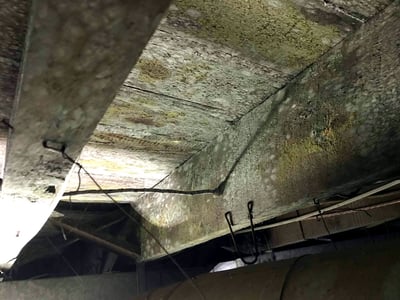 Mold spores can enter a building in a number of ways, even a commercial or public building. Additionally, spores are common in all kinds of buildings according to the cdc.org website. They can be carried in through the door, blown in through windows, vents, or heating and air conditioners. The problem happens when a source of water mixes with the spores, like from a flood, a leak, or persistent condensation.
Mold spores can enter a building in a number of ways, even a commercial or public building. Additionally, spores are common in all kinds of buildings according to the cdc.org website. They can be carried in through the door, blown in through windows, vents, or heating and air conditioners. The problem happens when a source of water mixes with the spores, like from a flood, a leak, or persistent condensation.
Whenever a building owner finds mold spores growing or existing in their building, it is critical to take action to completely remove them and replace infected materials, so not to expose building users. The biggest problems that businesses face with mold is exposure making their staff or customers sick, and (if necessary to mitigate the mold) keeping their operations going. The earlier a water source is stopped, the easier it is to remove without stopping business operations. It is Wolgast Restoration’s goal to keep your staff working while we safely remove the spores by following regulatory and specialist guidelines.
What to Do?
Not all mold spores are harmful and a natural level of spores are present in all buildings at all times. Any areas where harmful mold has grown to more than 10 s.f. in size, the EPA recommends hiring a certified professional because a written plan by an Industrial Hygienist is mandatory at that point. They will assess the type of mold and if it is harmful, create a method for getting the area back to an acceptable level and instruct the Remediation Team on how to remediate and prevent spores from spreading. This is important so spores don’t become loose and therefore able to be inhaled by building occupants or have them take up residence on another surface. The spores make people sick with headaches, allergies, asthma attacks, or worse, which is bad for staff’s wellbeing, productivity, and attendance.
Wolgast Restoration has certified professionals that mitigate and/or clean mold spores in homes, commercial buildings, and public institutions. We work with building owners to temporarily relocate occupants, while identifying the source of the water, fixing the issue causing mold growth, following the written Indoor Air Quality procedures, wearing appropriate PPE, and using containment equipment. The professionals will use drop clothes to cover and protect contents, use containment walls when necessary to block off whole rooms/sections of the building, and also use air scrubbers to reduce dust so that the rest of the building can remain open for business operations.
Mold’s Effect on Different Industries
Old buildings aren’t as well ventilated, and in their roof’s lifetime, have most likely experienced leaks. There are many K-12 school districts out there that have original buildings built 50+ years ago, and children are more susceptible to issues with mold due to their developing lungs. Since school buildings are used daily for an extended period of time, exposure can be extensive.
Likewise in an office setting, users or staff members have prolonged exposure that could be causing headaches, active allergies, or asthma attacks. Productivity or attendance issues could result.
In healthcare office settings, the exposure may not be as prolonged, but patients could be more sensitive if their immune systems are compromised.
Restaurants could be shut down for not addressing mold issues in their kitchen, bathroom or dining room.
If an infected area is less than 10 s.f., the EPA says a trained maintenance person can handle the cleanup using appropriate PPE and equipment. It’s good to note that according to the cdc.org website, “bleach does not kill mold. To remove small-scale, less than 10 s.f. mold infestation, use a mix of household detergent and water.” Again, infestations larger than that require trained remediation professionals, like those at Wolgast Restoration and an Industrial Hygienist to work together to properly mitigate the mold without spreading the spores. Michigan business owners and home owners, please keep our 24-hour emergency hotline number for your restoration needs, 855-WOLGAST.

